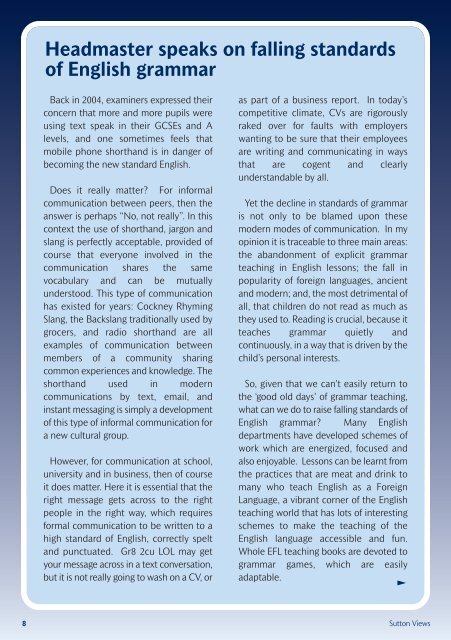You also want an ePaper? Increase the reach of your titles
YUMPU automatically turns print PDFs into web optimized ePapers that Google loves.
Headmaster speaks on falling standards<br />
of English grammar<br />
Back in 2004, examiners expressed their<br />
concern that more and more pupils were<br />
using text speak in their GCSEs and A<br />
levels, and one sometimes feels that<br />
mobile phone shorthand is in danger of<br />
becoming the new standard English.<br />
Does it really matter? For informal<br />
communication between peers, then the<br />
answer is perhaps “No, not really”. In this<br />
context the use of shorthand, jargon and<br />
slang is perfectly acceptable, provided of<br />
course that everyone involved in the<br />
communication shares the same<br />
vocabulary and can be mutually<br />
understood. This type of communication<br />
has existed for years: Cockney Rhyming<br />
Slang, the Backslang traditionally used by<br />
grocers, and radio shorthand are all<br />
examples of communication between<br />
members of a community sharing<br />
common experiences and knowledge. The<br />
shorthand used in modern<br />
communications by text, email, and<br />
instant messaging is simply a development<br />
of this type of informal communication for<br />
a new cultural group.<br />
However, for communication at school,<br />
university and in business, then of course<br />
it does matter. Here it is essential that the<br />
right message gets across to the right<br />
people in the right way, which requires<br />
formal communication to be written to a<br />
high standard of English, correctly spelt<br />
and punctuated. Gr8 2cu LOL may get<br />
your message across in a text conversation,<br />
but it is not really going to wash on a CV, or<br />
as part of a business report. In today’s<br />
competitive climate, CVs are rigorously<br />
raked over for faults with employers<br />
wanting to be sure that their employees<br />
are writing and communicating in ways<br />
that are cogent and clearly<br />
understandable by all.<br />
Yet the decline in standards of grammar<br />
is not only to be blamed upon these<br />
modern modes of communication. In my<br />
opinion it is traceable to three main areas:<br />
the abandonment of explicit grammar<br />
teaching in English lessons; the fall in<br />
popularity of foreign languages, ancient<br />
and modern; and, the most detrimental of<br />
all, that children do not read as much as<br />
they used to. Reading is crucial, because it<br />
teaches grammar quietly and<br />
continuously, in a way that is driven by the<br />
child’s personal interests.<br />
So, given that we can’t easily return to<br />
the ‘good old days’ of grammar teaching,<br />
what can we do to raise falling standards of<br />
English grammar? Many English<br />
departments have developed schemes of<br />
work which are energized, focused and<br />
also enjoyable. Lessons can be learnt from<br />
the practices that are meat and drink to<br />
many who teach English as a Foreign<br />
Language, a vibrant corner of the English<br />
teaching world that has lots of interesting<br />
schemes to make the teaching of the<br />
English language accessible and fun.<br />
Whole EFL teaching books are devoted to<br />
grammar games, which are easily<br />
adaptable.<br />
8 <strong>Sutton</strong> Views


